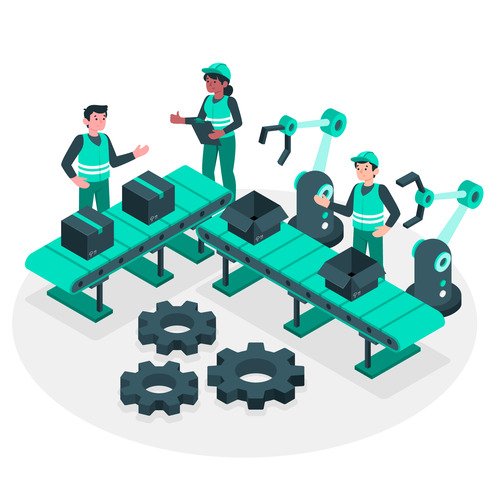The manufacturing sector, a cornerstone of global economic development, is undergoing a significant transformation. As industries evolve to meet the challenges of sustainability, efficiency, and competitiveness, integrating information technology (IT) has emerged as a critical driver of growth. IT services for manufacturing companies are not only enhancing operational efficiency but also paving the way for sustainable practices, with artificial intelligence (AI) in manufacturing playing a pivotal role.
The Role of IT Services in Manufacturing
IT services for manufacturing companies are reshaping traditional processes by enabling seamless data flow, improving decision-making, and automating critical tasks. From enterprise resource planning (ERP) systems to advanced analytics, IT solutions are central to modern manufacturing ecosystems. These services address key areas such as:
- Supply Chain Optimization IT solutions improve supply chain visibility and agility. By integrating real-time tracking and predictive analytics, manufacturers can anticipate disruptions, optimize inventory levels, and ensure timely deliveries.
- Production Efficiency IT-driven automation, powered by AI, enhances production processes by minimizing downtime and maximizing resource utilization. Sensors and IoT devices provide real-time insights into machine performance, enabling predictive maintenance.
- Quality Assurance Advanced IT systems ensure consistent product quality by analyzing production data and identifying anomalies. AI algorithms can detect defects early, reducing waste and maintaining high standards.
- Sustainability Initiatives IT tools help manufacturers track energy consumption, reduce emissions, and adopt eco-friendly practices. Smart energy management systems and AI-driven analytics play a crucial role in achieving sustainability goals.
The Impact of AI in Manufacturing
AI in manufacturing is revolutionizing how factories operate. From predictive analytics to autonomous systems, AI technologies are driving unprecedented levels of efficiency and innovation. Key applications include:
- Predictive Maintenance AI algorithms analyze sensor data to predict equipment failures before they occur. This proactive approach reduces downtime, extends machinery lifespan, and cuts maintenance costs.
- Process Optimization AI systems optimize production schedules, ensuring that resources are allocated efficiently. Machine learning models can simulate various scenarios, helping manufacturers choose the most cost-effective and sustainable options.
- Robotics and Automation AI-powered robots are transforming assembly lines by performing complex tasks with precision. Collaborative robots, or cobots, work alongside humans, enhancing productivity and safety.
- Supply Chain Management AI improves supply chain resilience by analyzing market trends, demand forecasts, and logistics data. This enables manufacturers to adapt quickly to changing conditions.
- Energy Efficiency AI-driven solutions monitor and optimize energy usage across facilities. By identifying inefficiencies and suggesting corrective actions, these tools contribute to significant cost savings and reduced environmental impact.
Case Studies: IT and AI Transforming Manufacturing
1. Smart Factories
Leading manufacturers are adopting smart factory initiatives that integrate IT and AI technologies. For example, a global automotive company implemented an AI-driven quality control system that reduced defect rates by 30%. The system uses machine learning to identify patterns in production data, ensuring consistent product quality.
2. Sustainable Manufacturing
A consumer goods manufacturer leveraged IT services to develop a smart energy management system. By analyzing energy consumption patterns, the company reduced its carbon footprint by 20% while achieving substantial cost savings.
3. Predictive Analytics in Action
A heavy machinery manufacturer utilized AI-powered predictive maintenance tools to monitor equipment health. This initiative reduced unplanned downtime by 40%, enhancing operational efficiency and customer satisfaction.
Benefits of Integrating IT for Sustainable Growth
The integration of IT services in manufacturing offers numerous benefits that align with sustainable growth objectives:
- Enhanced Efficiency IT solutions streamline operations, reducing waste and improving resource utilization. Automated systems and data-driven insights ensure optimal performance.
- Cost Savings By minimizing downtime, optimizing supply chains, and reducing energy consumption, IT services help manufacturers save costs while maintaining high productivity.
- Environmental Sustainability IT-driven sustainability practices, such as energy management and waste reduction, contribute to a greener manufacturing sector. AI tools enable manufacturers to track and reduce their environmental impact.
- Improved Competitiveness Manufacturers that embrace IT and AI gain a competitive edge by delivering high-quality products faster and more efficiently. This positions them as industry leaders in an increasingly digital landscape.
- Resilience and Agility IT solutions enhance supply chain resilience, enabling manufacturers to adapt quickly to disruptions. AI-driven forecasting tools provide the flexibility needed to navigate volatile markets.
Challenges and Solutions
While the benefits are compelling, integrating IT and AI in manufacturing comes with challenges, including:
- High Implementation Costs Solution: Manufacturers can start with scalable IT solutions and gradually expand their capabilities. Government incentives and partnerships with technology providers can help offset initial costs.
- Skill Gaps Solution: Investing in employee training and upskilling ensures that the workforce is prepared to leverage advanced technologies effectively.
- Data Security Concerns Solution: Robust cybersecurity measures, such as encryption and access controls, protect sensitive manufacturing data from breaches.
- Resistance to Change Solution: Clear communication of the benefits and involving stakeholders in the decision-making process can foster acceptance and enthusiasm for IT integration.
The Future of IT in Manufacturing
The future of manufacturing lies in the seamless integration of IT and AI technologies. Emerging trends include:
- Digital Twins Digital twin technology creates virtual replicas of physical assets, enabling real-time monitoring and optimization. This innovation enhances decision-making and reduces operational risks.
- 5G Connectivity The adoption of 5G networks will enable faster and more reliable data exchange, supporting advanced applications such as remote monitoring and augmented reality (AR) in manufacturing.
- Sustainable Innovation IT and AI will continue to drive sustainability efforts, with a focus on circular economy principles and renewable energy integration.
- Human-Machine Collaboration The rise of cobots and AI-driven tools will enhance collaboration between humans and machines, creating safer and more efficient work environments.
Conclusion
Integrating IT services for manufacturing companies is no longer optional—it is essential for sustainable growth and long-term success. By leveraging the power of AI in manufacturing, companies can achieve operational excellence, reduce environmental impact, and stay competitive in a rapidly evolving industry. As technology continues to advance, the manufacturing sector has an unprecedented opportunity to redefine its future, one that is efficient, sustainable, and innovative.

